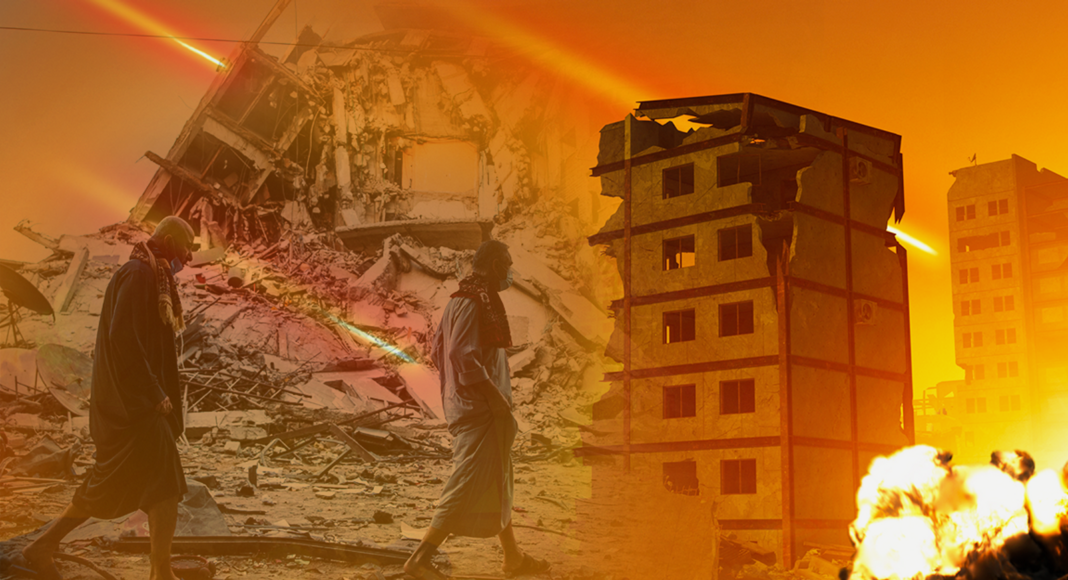Fundamental facts on the ground will have to change for the truce between Israel and Hamas in Gaza to hold.
The past 11 days of bombardments did not just spark overnight.
They were the product of decades of failed diplomacy and the inability to turn previous ceasefires into a lasting peace between Palestinians and Israelis.
But the goal of a Middle East peace deal acceptable to all sides has been one that repeated generations of leaders in Israel, the occupied Palestinian territories and the wider international community – in particular the United States – have been unable to achieve.
Image:
Palestinians inspect their destroyed homes, as they returned following the ceasefire. Pic: AP
Joe Biden, the latest US president on whose watch this crisis has erupted, talked on Thursday night of the need for Arabs and Jews to life safely and enjoy equal rights.
“I believe we have a genuine opportunity to make progress and I am committed to working for it,” he said.
But to make progress will require the Israeli government and Palestinian leaders to make compromises on differences that they have never previously been able to overcome.
A sense of the dilemma can quite neatly be summed up by the flashpoint neighbourhood of Sheikh Jarrah in East Jerusalem.
Jewish settlers have filed a legal attempt to evict a number of Palestinian families from their homes, saying that the land rightfully belongs to them.
The Palestinians, who have lived in the area for generations, disagree and claim they face the threat of illegal eviction.
Anger at the litigation among Israel’s Palestinian minority as well as among communities across the West Bank and Gaza was one of the triggers that ignited the confrontation between Hamas and Israel.
Image:
Beit Hanoun – northern Gaza Strip. Pic: AP
Resolving what the Israeli authorities frame as a “legal dispute” but which Palestinians say is a matter of fundamental human rights is one of the demands Hamas has made as part of its agreement to stop firing rockets.
For Israel, the government said its goal was to “restore deterrence”. In other words, to inflict enough damage on Hamas’s military capabilities – its rocket launchers, weapons stockpiles and a network of tunnels the Israeli military says it uses to move around – that Israel can be confident it will not face another barrage of attacks for years.
But this is not simply a matter of military provocations.
Emotional wounds on both sides – embodied by Sheikh Jarrah – run deep across the region.
They cannot be healed by warm words but will need concentrated, persistent engagement by the United States as well as other members of the international community.
At least there has been a taste of diplomatic success in the form of the ceasefire.
Egypt, with its ability to speak with Hamas, as well as Israel’s Prime Minister Benjamin Netanyahu, played the most important role.
Qatar too, where Ismaeil Haniyeh, the leader of Hamas, has been allowed to live, was a key broker in the behind-the-scenes-talks.
Israel, like many countries, including the United Kingdom and the United States, regards Hamas as a terrorist organisation.
So, having allies like Egypt, Qatar and also Jordan that are able to relay messages and act as intermediaries has been vital in restoring calm every time Gaza erupts in flames and Palestinian rockets rain down on Israel.
Subscribe to the Daily podcast on Apple Podcasts, Google Podcasts, Spotify, Spreaker
Senior officials working for the United Nations were also closely involved.
What was perhaps different this time around was the ability, or not, of the United States to influence the passage of events.
After four-years of an administration under Donald Trump with an unabashedly pro-Israeli stance, US-Palestinian ties had been badly damaged.
Mr Biden then chose not to prioritise issues in the Middle East during his few months as president, failing even to appoint an ambassador to Israel.
It meant the White House was perhaps caught off-guard when weeks of mounting tension between Palestinians and Israelis in Jerusalem led to exchanges of fire on 10 May.
Image:
Donald Trump and Benjamin Netanyahu
The president moved belatedly to reengage, sending in a senior envoy to speak with Israel and the Palestinian Authority, under Palestinian President Mahmoud Abbas.
Mr Biden also picked up the phone to Mr Netanyahu as did other world leaders.
Despite the initial burst of diplomatic activity, Israeli airstrikes and Hamas rocket fire worsened. Calls for a de-escalation grew.
They culminated in the carefully choreographed release of statements from the Israeli government and Hamas on Thursday night that they had agreed on a ceasefire.
The big question now is – will it last?




